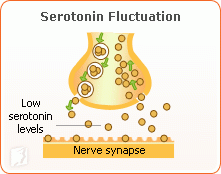Unfortunately, mood swings - a rapid and sometimes inexplicable change in mood from euphoric to depressed - can affect women at any age, especially during her menopause years. Because mood swings are unpredictable and can affect both personal and professional relationships, many women seek non-invasive ways to manage them. Continue reading for more information about the symptoms, causes, and treatments of mood swings.
Causes of Mood Swings

By far, the most common cause of mood swings during menopause is hormone fluctuations. Estrogen and serotonin levels are constantly oscillating during the years surrounding menopause. On top of the physiological causes of mood swings, many menopausal women also suffer from fatigue and stress brought on by external factors - families, careers, finances, etc. These factors can significantly exacerbate mood swings if a woman is already experiencing.
Mood swings are different for all women, but it is important to recognize some of the signs and symptoms, so that you can learn how to control or manage changes in mood.
Symptoms of Mood Swings
Women will experience menopause and its symptoms differently, including mood swings. However, some of the most common characteristics of mood swings include:

- Increased stress
- General sadness, depression, or melancholy
- Frequent mood changes
- Irritability
- Aggression
- Lack of motivation
Treatments for Mood Swings in Menopausal Women
Women who are experiencing any of the common mood swing symptoms do not have to suffer in silence. A wide variety of treatments are available, and they can be combined according to individual needs. Treatments for mild to severe mood swings range, some of which include:
- Lifestyle changes
- Alternative medicine
- Prescription medications
It is recommended that women incorporate simple lifestyle changes as a first step to managing symptoms. Many women choose to complement their lifestyle changes with alternative medicine, such as herbal supplements.
Because of the higher risk associated with prescription medications, they are typically reserved as a last resort for persistent and severe mood swings.
Women who want to manage their mood swings and other menopausal symptoms should research these different forms of treatments and consult their doctors. Click on the following link for more details about mood swing treatments.
Sources
- Amin, Zenab; Turhan Canli; and C. Neill Epperson. "Effects of Estrogen-Serotonin Interactions on Mood and Cognition." Behav Cogn Neurosci Rev 2005; 4; 43.
- Dr. Love, Susan, and Karen Lindsey. Dr. Susan Love's Menopause and Hormone Book. New York: Three Rivers Press, 2003.
- Molecular Psychiatry.(n.d)."Estrogen Promotes Gender Difference in Brain's Response to Stress." Retrieved from www.psycheducation.org
- The Health Center. (n.d)."Adult Mood Swings." Retrieved from www.thehealthcenter.info



